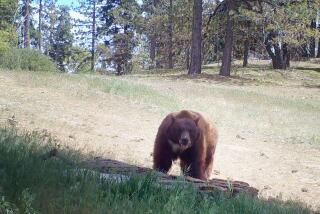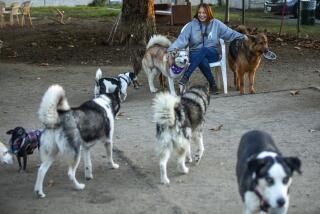Scientists stake out wolves to see whether their yawns are contagious
People do it. So do chimpanzees, bonobos and baboons. Even dogs do it: They yawn when someone near them yawns. But why? Scientists believe it’s a sign that these animals are capable of feeling empathy – and a new study of wolves suggests it’s more widespread among animals than experts had realized.
Yawning in response to another yawn isn’t an emotional reaction per se, but the tendency for yawns to be contagious has been “clinically, psychologically, neurobiologically, and behaviorally linked to our capacity for empathy,” according to the Japanese researchers who conducted the study. Humans and other primates are more susceptible to contagious yawning when they are around those with which they share “a close social bond.” In people, contagious yawning is more common among those who get high scores on empathy tests, and it’s less common among those on the autism spectrum who lack empathy, the researchers noted.
Yawning is also contagious for dogs. But there’s a twist: they don’t yawn in response to yawns from other dogs, but to yawns from people. What’s more, the yawns are more contagious when the person doing the yawning has a strong emotional connection to the dog.
These observations caused researchers from the University of Tokyo to wonder whether dogs’ status as man’s best friend made them the only nonprimate species capable of contagious yawning.
“Domestic dogs are unusually skilled at reading human social and communicative behaviors,” they noted in their study, published Wednesday by the journal PLOS ONE. “Thus, it could be possible that dogs’ ability to yawn contagiously evolved with the capacity for reading human communicative signals.”
On the other hand, if dogs had an innate susceptibility to contagious yawning, then wolves should do it too. Wolves are the closest living relatives of dogs, and they are “a highly social and cooperative species,” the researchers wrote.
So off they went to the Tama Zoological Park, a 129-acre zoo about 20 miles from the heart of Tokyo. Among the residents was a pack of 12 wolves – a mother, a father and their 10 offspring (five males and five females). They logged 254 hours of observation time over a five-month period, paying special attention to instances of yawning.
Only yawns that occurred when wolves were awake, relaxed and not in distress were included in the analysis. When such a yawn was observed, the researchers noted the wolf involved, the other wolves nearby (defined as being “within two body lengths”), and where these wolves were looking when the yawn occurred. (Nearby wolves were not counted if their eyes were closed at the time of the yawn.) Then the researchers watched the nearby wolves for the next three minutes to see if any of them yawned too. If they did, they noted the gap in time between the initial yawn and the follow-up yawn.
As a control, the researchers also watched the wolves for three-minute periods that didn’t start with a yawn.
The scientists found that the wolves were indeed more likely to yawn after another wolf near them had yawned. But not all “trigger” yawns were the same. A yawn was more likely to prompt a follow-up yawn if the two animals had a strong social bond. (Not only that, but among females, the closer the bond, the shorter the gap between the first and second yawn.) Yawns were also more likely to be contagious if they could be seen, not just heard.
“Yawning in wolves is contagious,” the researchers concluded. And that makes sense, they added: “For a highly social animal such as the wolf, coordinating activities has obvious adaptive advantages, since it promotes social cohesiveness of the pack.”
The fact that yawns from favorite fellow wolves were more contagious than yawns from others adds support to the notion that contagious yawning is related to empathy, and that the “basic building blocks of empathy might be present in a wide range of species,” they wrote.
The study was funded by the Japan Society for the Promotion of Science and the Japanese Ministry of Education, Culture, Sports, Science and Technology.
If science keeps you wide awake, follow me on Twitter @LATkarenkaplan and “like” Los Angeles Times Science & Health on Facebook.







